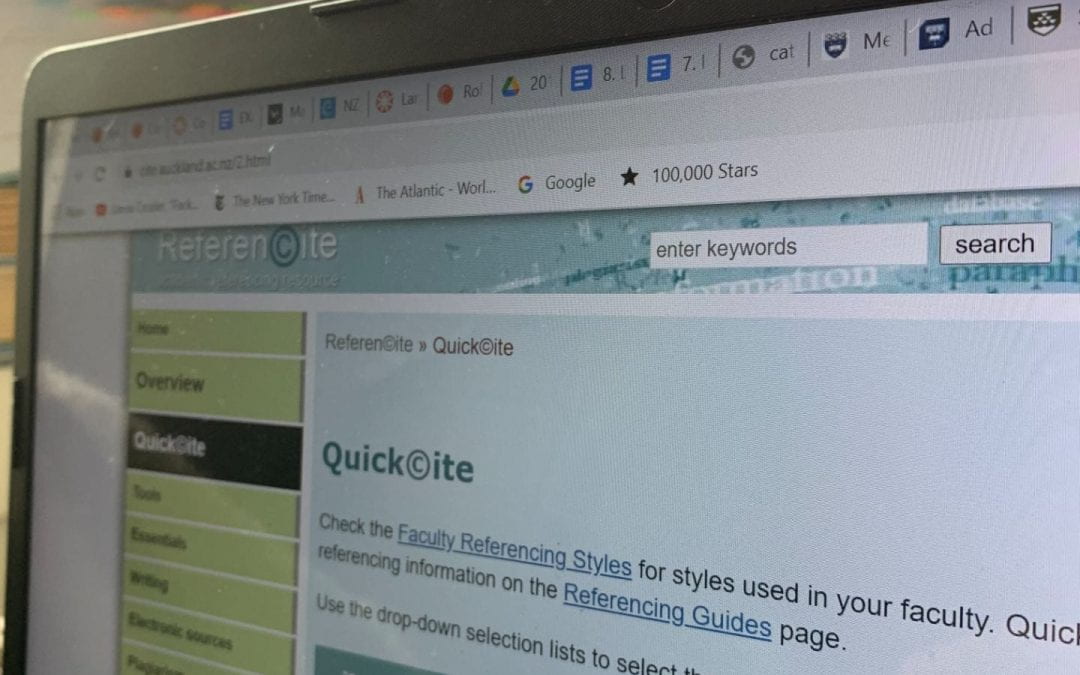An elephant in the room: an obvious major problem or issue that people avoid discussing or acknowledging.
Merriam-Webster Dictionary. “elephant in the room,” accessed October 22, 2021, https://www.merriam-webster.com/dictionary/elephant%20in%20the%20room.
Unfortunately, I never thought I’d refer to referencing as the elephant in the room. But it just has to be said. I came out of high school having never used APA or MLA or Chicago – just writing the author name, title, page number, and link to the source, and thinking that would get me through university.
It was always in the course information – sometimes mentioned in classes, but everyone assumes your work will be appropriately referenced. It’s a big part of academic integrity – you can have serious consequences for plagiarism. But referencing was never drawn to our attention as a concern. I think everyone just assumes you know how to do it, and you will. It’s also a silly way to lose marks.
This is probably the most practical, useful piece of advice I’ve given in any of these blogs – get comfortable with referencing in high school. When you start at university, do it while you gather your sources, with time to double check. Doing it last minute, split-screen, double checking I’m using MLA and not Chicago, figuring out if it’s an article or a book chapter, italics on title and not on issue name, square brackets or round brackets is a pain, but it makes a good first impression for whoever is marking your assignment and it’s important for academic integrity. I always think I need more time to polish my assignment, when really proper referencing is just a tick in a marking rubric and you can get full marks for it.
This is what I recommend doing:
1 – Figure out the requirements by your faculty. This is a great resource to make sure your sources are properly referenced, and it also links to all faculty referencing styles. https://www.cite.auckland.ac.nz/2.html
But if they’re not too specific, it’s usually Chicago or MLA.
2 – When you first start your assignment, check the information published by your lecturer and look for any information on referencing before you email your lecturer or tutor. Sometimes it’s in the coursework or syllabus. I usually just hit Ctrl-F and search for ‘referencing’ (but reading the whole thing can be useful to figure out what lecturers are looking for and expecting from you).
Figure out if you need footnotes and a bibliography. Check if they’re included in the wordcount.
3 – If you have any questions, then ask on Piazza (if you want to be helpful, because other students may have the same question as you), or ask your tutor or lecturer. I usually find it important to ask if page numbers, headers, the essay question, or your student ID are included in the wordcount (sometimes they are) or if a 10% or 15% leeway applies. These are all important questions I wish I’d asked before finishing my assignment and realizing I’m just at the wordcount and not being able to submit until I know.
4 – Tips for Law Students.
All references need to comply with the New Zealand Law Style Guide. https://www.lawfoundation.org.nz/style-guide2019/table_of_contents.html
The New Zealand Law Style Guide also has useful information for university student work:
https://www.lawfoundation.org.nz/style-guide2019/appendix-7.html
It’s great to become familiar with this because it’s very specific and you may need to ask ahead of time what your source classifies as (e.g. citing a lecturer, a case cited within a judgement, etc).
That is all for now! Good luck with exams (whether it’s NCEA or university). 😊
